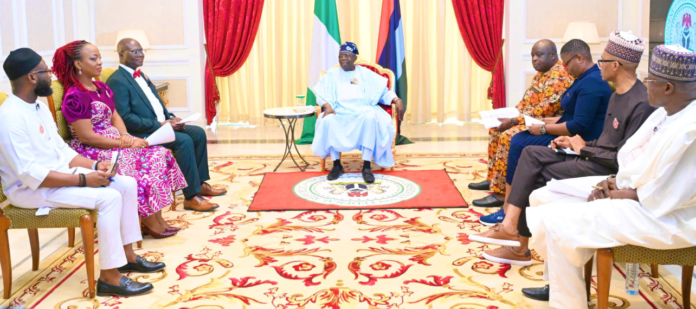By Joke Kujenya
ECONOMIC HARDSHIPS continue to burden Nigerians following key reforms introduced by President Bola Tinubu since his assumption of office in May 2023.
Rising inflation, a weakening naira, and surging fuel prices have sparked nationwide discontent, but the President remains resolute.
During his maiden presidential media chat held at his Bourdillon residence in Ikoyi, Lagos on Monday, Tinubu said his administration would not reverse its controversial economic policies, including subsidy removal and recent tax reforms.
He emphasised that these measures are critical for repositioning Nigeria’s struggling economy.
On Petrol Subsidy Removal
Defending the removal of petrol subsidies in May 2023, Tinubu said, “We were spending our future, deceiving ourselves.
The reform was necessary.” Since the subsidy removal, petrol prices have soared from ₦200 to over ₦1,000 per litre, worsening the cost of living for citizens.
Tinubu noted that the liberalised market has ended monopolies and encouraged competition, leading to a gradual reduction in pump prices.
He affirmed he has no regrets. “I don’t have any regrets whatsoever in removing petrol subsidy because we cannot continue to be spending our future and deceiving ourselves.”
The President argued that the reform has fostered competition in the sector.
“The market is being saturated. No monopoly, no oligopoly—just a free-market economy flowing,” he explained, noting that petrol pump prices had gradually reduced over time.
Tinubu also dismissed the idea of price control, saying, “I don’t believe in price control. We will work hard to supply the market.”
Justified His Large Cabinet
Responding to criticisms of his 48-member cabinet being labelled as “bloated,” Tinubu firmly rejected the idea of downsizing.
“I am not ready to shrink the size of my cabinet,” he said. He explained that efficiency had guided his ministerial selections.
In October 2024, Tinubu had re-assigned 10 ministers and appointed seven new ones. This caused critics to argue that the cabinet remains excessively large, particularly with the creation of new portfolios such as the Ministry of Livestock.
However, the President defended the creation of the Ministry of Livestock, stating it was necessary to address the complexities of animal husbandry and its economic significance.
Stampedes During Palliative Distribution
Tinubu attributed the recent deadly stampedes during palliative distributions in Oyo, Anambra, and Abuja to poor organisation and indiscipline.
Speaking on these incidents that claimed multiple lives, the President said, “It is very sad that people are not well-organised. We just have to be more disciplined in our society. My condolences to those who lost family members.”
He cited his own experience of over 25 years in charity work, saying such tragedies could be avoided with better organisation. “If you know you don’t have enough to give, don’t attempt to publicise it,” he advised.
He noted that the Inspector-General of Police (IGP) has since urged organisers of charity events to involve security agencies and implement proper crowd management protocols to prevent further tragedies.
Defending Controversial Tax Reforms
President Tinubu reiterated his administration’s commitment to tax reforms, despite resistance from some stakeholders.
He declared: “Tax reform is here to stay,” explaining that Nigeria could not rebuild its economy using “old, broken books.”
He further defended the reforms, describing them as pro-poor initiatives designed to eliminate colonial-era tax practices.
“The vulnerable are not to pay taxes,” he noted, adding that tax reforms were essential for long-term economic stability.
And despite backlash, particularly from northern stakeholders, Tinubu urged the National Assembly to proceed with passing the four tax reform bills submitted since October.
These include the Nigeria Tax Bill, Nigeria Tax Administration Bill, Nigeria Revenue Service Establishment Bill, and the Joint Revenue Board Establishment Bill, dubbing them as necessary measures to boost the economy.





